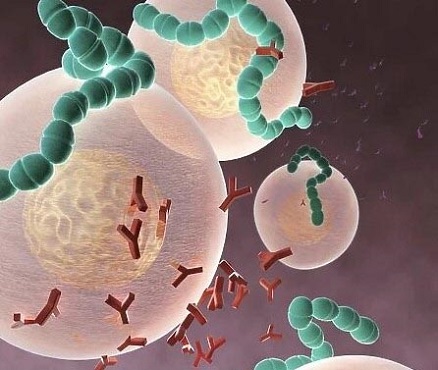New immune protein UBXN3B identified as playing a key role in B cell development and immunity
Nikhil Prasad Fact checked by:Thailand Medical News Team Jul 23, 2024 1 year, 4 months, 4 weeks, 2 days, 19 hours, 55 minutes ago
Immunology Updates: Researchers from the University of Connecticut-USA, Yale University-USA, Tianjin University of Traditional Chinese Medicine-China, and Tsinghua University-China have made a significant discovery about a protein called UBXN3B. This protein plays a crucial role in the development of B cells, a type of white blood cell essential for the adaptive immune system. This
Immunology Updates news report delves into the findings of this groundbreaking study and its implications for understanding the immune system and potential treatments for B-cell-related diseases.
 New immune protein UBXN3B identified as playing a key role in B cell development and immunity
The Significance of B Cells
New immune protein UBXN3B identified as playing a key role in B cell development and immunity
The Significance of B Cells
B cells are an integral part of the immune system. They produce antibodies that help the body fight off infections and are involved in the immune system's adaptive response. B lymphopoiesis, the development of B cells, occurs in the bone marrow and involves several stages, from progenitor cells to mature B cells. This process ensures that the body maintains a robust and responsive immune defense.
Key Findings: UBXN3B and B Cell Development
The study aimed to understand the role of UBXN3B in the immune system by using tamoxifen-inducible global and B cell-specific knockout mice. The results were striking. In the absence of UBXN3B, there was a significant reduction in the number of B cells at various stages of development. Specifically, the numbers of small precursor B-II cells, immature B cells, and mature B cells decreased by more than 60%, 70%, and 95%, respectively.
This marked reduction indicates that UBXN3B is crucial for B cell development. The researchers observed that the deficiency of UBXN3B led to impaired pre-B cell receptor (pre-BCR) signaling and cell cycle arrest, both of which are vital for the progression and maturation of B cells. Additionally, the mature B cell population rapidly decreased due to increased apoptosis, highlighted by higher levels of pro and activated caspase-3 proteins.
Implications for Viral Immunity
The study further revealed that the absence of UBXN3B makes mice more susceptible to respiratory viruses, including SARS-CoV-2, the virus responsible for COVID-19, and influenza. These knockout mice exhibited higher viral loads, prolonged lung immunopathology, and reduced production of virus-specific IgM and IgG antibodies. This increased vulnerability underscores the importance of UBXN3B in maintaining a functional and effective immune response to viral infections.
Mechanistic Insights: Pre-BCR Signaling
Pre-BCR signaling is essential for the proliferation and survival of pre-B cells. This signaling pathway ensures that pre-B cells progress through their developmental stages properly. The study revealed that UBXN3B is vital for maintaining this signaling pathway. In UBXN3B-deficient mice, there was a notable reduction in the phosphorylation of key signaling proteins such as BTK, MEK, ERK, PLC-&am
p;gamma;, and NF-κB in large pre-BII cells. This impairment in signaling disrupts the normal development and function of B cells, leading to the observed deficiencies.
Human Relevance: NALM6 Cells
To test if these findings apply to humans, researchers knocked out UBXN3B in NALM6 cells, a human pre-B cell line derived from acute lymphoblastic leukemia. They observed similar impairments in BCR signaling and calcium influx, confirming the protein's crucial role in B cell development and function. These findings suggest that the role of UBXN3B in B cell development is conserved across species, highlighting its fundamental importance in the immune system.
Future Directions and Therapeutic Potential
The study's findings suggest that UBXN3B is essential for B lymphopoiesis and immune response. Given its significant role, UBXN3B could be a potential therapeutic target for treating B-cell-related diseases, such as B lymphomas and autoimmune disorders. Targeting UBXN3B or its pathways could help in developing new treatments that enhance B cell function and improve immune responses in patients with these conditions.
Conclusion
This comprehensive study highlights the critical role of UBXN3B in B cell development and immune response. By maintaining pre-BCR signaling and cell survival, UBXN3B ensures the proper functioning of the adaptive immune system. The findings open new avenues for research and potential therapies targeting B-cell-related diseases.
The study findings were published in the peer-reviewed journal: eBioMedicine.
https://www.thelancet.com/journals/ebiom/article/PIIS2352-3964(24)00284-6/fulltext
For the latest
Immunology Updates, keep on logging to Thailand Medical News.
Read Also:
https://www.thailandmedical.news/news/antibody-targeting-il-1-receptor-7-protects-from-lps-induced-inflammation
https://www.thailandmedical.news/news/immunology-updates-newly-discovered-role-of-dot1l-in-shaping-the-defense-system
https://www.thailandmedical.news/news/serpinb9-a-new-frontier-in-immunotherapy
https://www.thailandmedical.news/news/tregitopes-a-revolutionary-approach-to-treating-immune-disorders
https://www.thailandmedical.news/news/meet-the-hidden-hero-in-our-immune-system-socs1
